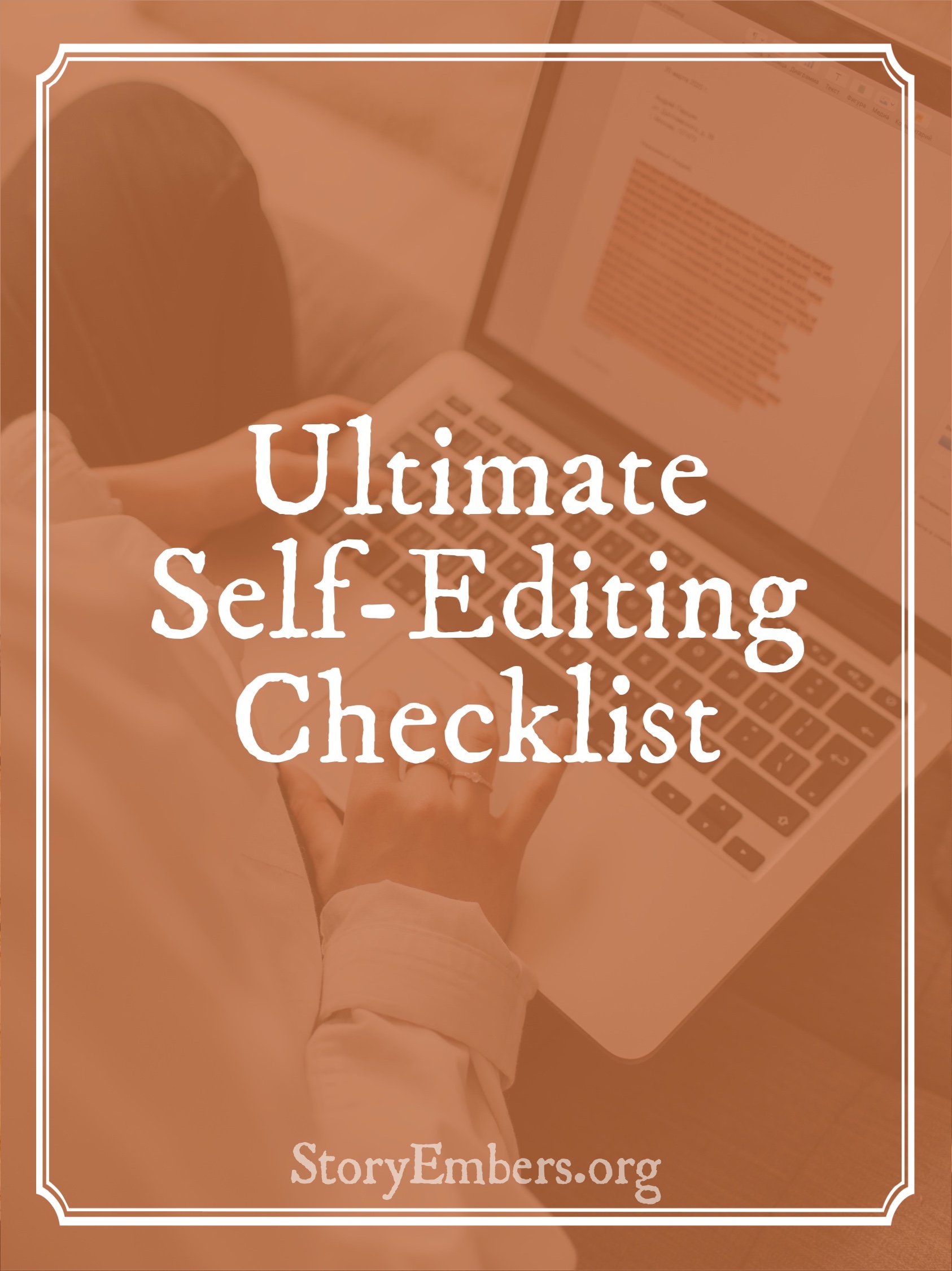You’re revising a scene when a vague, restless feeling creeps into your gut. Somewhere, somehow your manuscript has taken a wrong turn. You see this as clearly as if a warning sign suddenly appeared in the middle of your path. But after you retrace your steps to the character you misshaped or the plot hole you bypassed, you can’t seem to repair the damage.
Every story you consume informs your instincts about plot structure, prose, and characters, and when problems crop up in any one of those areas, an alarm sounds at the back of your mind. Unfortunately, no matter how savvy you are at detecting issues, the solutions won’t be as obvious. If your villain flops when he strides onto the stage, you won’t immediately come to the conclusion that his clichéd backstory and monologuing habits need gutted. Maybe you try to make him scarier, only for him to do a bigger belly flop.
The disconnect between your ability to identify and straighten out problems is nerve-wracking because you don’t want to write an entire novel without realizing a huge flaw is undermining everything. However, you shouldn’t pause every time you’re uneasy either. If you wait for complete peace, your floppy villain will tell more stories than you ever will. Instead, you need to learn how to interpret your intuition’s signals through courageously pushing forward, relieving the strain on your imagination, and seeking feedback from others.
Approach #1: Keep Writing
Sometimes writers get stuck in the planning process, fussing over every event in their outlines. A story premise without a prearranged course is sure to lead to failure, or so they believe. But this fear clogs the flow of creativity you need for handling dilemmas during the prewriting stage.
A few months ago, I had all the parts of a cool short story: a hardcore protagonist, a spooky setting, and an edgy conflict. But I couldn’t figure out what its theme should be. I cycled through so many possibilities that I wore myself out, so I just picked one I didn’t loathe and started typing. As I familiarized myself with the world, the antagonist began raising compelling questions I’d overlooked in my obsession over finding a theme. Once I understood the motives, values, and emotions of my cast of characters, a theme emerged organically. I had to invest a few hours of writing, but the fresh perspective was worth the effort.
Sometimes the answer to your problem is like invisible ink: all you need to do is spill words onto a page and it will show up among them.
Exploring a story without a glimmer of a theme to guide you is an act of faith. As you draft, you hope that your characters will bare their souls. It’s a risk, and if you aren’t confident that it will offer results, you can take a shortcut: write the book as a short story first. Quinlyn submitted a brilliant article on the topic, so I won’t rehash her points, but a short story forces you to fill in character motivations, setting quirks, and historical facts. When all these details rub against each other in a compact space, the theme for your novel might spark to life.
You can also apply this tactic to a troublesome chapter or a wooden character by extracting them from your narrative and inserting them into a self-contained, smaller piece. Fleshing out a moment in your protagonist’s past, a side character’s POV, or a disaster that occurred years before the story opens might put you back on track.
Although experimentation is ideal for unleashing your creativity, it won’t always reveal why your writing instincts are niggling you. If every paragraph you crank out feels contrived, you can’t break through writer’s block after multiple attempts, or none of the ideas you brainstorm fit your story, you need to reverse your strategy: stop writing.
Approach #2: Take a Break
I know, I know. I’m contradicting my own advice. But when you’re dealing with something as complex as your intuition, you can’t expect it to respond to the same stimulus in every case. If you’re trying too hard, you might be causing your imagination to shut down, and distance from your project will reset it.
When I reached the climax of my short story, I didn’t like it. I was introducing too many elements at once, and it turned out darker than I’d intended. Tired and stumped, I decided to switch to housecleaning. Two minutes after I tore my eyes away from the screen, the climax clicked into place. I deleted the offending section and uncovered my antagonist.
A breather gave me clarity because my subconscious mind continued to simmer until a revelation bubbled to the surface. I first ran across this concept in an ACT prep book. If students couldn’t solve a math problem within a few minutes, the manual recommended that they skip it and return later. That way, their subconscious minds could wrestle with the little bugger while their conscious minds tackled the next problem. I couldn’t say whether this trick helps with an ACT, but it definitely does with stories. When inspiration is being elusive, removing the pressure may be your best option.
The amount of space you need will vary. Ideas for short projects can arrive in a flash, but large projects may require weeks or even months. I can’t predict how long before your intuition will shout at you, but be careful that you don’t use the interlude as an excuse to procrastinate. Neither avoiding nor rushing your work-in-progress is healthy. Aim for a balance between relaxation and productivity, then watch what happens during the moments when your focus isn’t on writing.
Approach #3: Ask Someone Else to Read Your Story
You’ve written your premise as a short story. You’ve taken breaks. You’ve even read your manuscript while hanging upside down, searching for a new angle, but you still can’t decode the message your instincts are sending. Now’s the time to call in reinforcements.
When I finished the second draft of one of my fantasy novels, I sensed that it contained flaws. But I’d poured so much time and energy into edits that my judgment seemed clouded. My beta readers served as intuition interpreters. They confirmed my suspicions, and instantly I could pinpoint what was bothering me.
If your intuition won’t leave you alone, enlist a more experienced writer to look at your manuscript. She’ll have had extra practice at tuning her ear to her writing instincts and will be able to apply the skills she’s accumulated over the years to your story.
When you contact this person, however, remember to be polite, specific, and, if possible, generous. If you have time to read her latest manuscript in return, money to thank her with an Amazon gift card, or an email list to promote her on, that will make her more willing to agree to your request. If all the expert writers seem too busy, you can reduce the size of the favor. Instead of dumping a 90,000-word novel into someone’s inbox, you could share only the first couple chapters. Whatever sacrifices you need to make, getting another pair of eyes on your manuscript is vital.
Most writers juggle full schedules, but they’re also eager to contribute to the writing community when they can. Their instincts will be sharper and more objective than yours since they aren’t as close to your WIP, so even if handing it over for a week causes you anxiety, the insight you’ll gain will be invaluable.
Trust Your Instincts, Not Your Sense of Urgency
Sometimes writers feel pressed for time. If they explore a story that isn’t thoroughly planned out, take a rest, or surrender their manuscript for a few seconds to get a second opinion, they’ll miss some grand opportunity and be forever doomed to be an unpublished author. Their parents and relatives will be disappointed in their career choice, and they’ll be forced to return to college for a business degree.
This lie will fuel your insecurities and destroy your perspective. When you hesitate to listen to the whispers of your writing instincts, you need to recognize that what you’re really worried about is wasting time. And if you’re not patient with yourself, you’ll never refresh your creativity so that you can write another day.
Crafting a story is about the journey and the destination. You discover more about storytelling—and life in general—while you’re engaged in the act of creation rather than afterward. When you embrace the messy process, slow down, and pay attention, that’s when real, meaningful stories form.
Editor’s Note: Post originally published on April 12, 2021. Updated April 24, 2023.

A long time ago on a hill not so far away, Gabrielle Pollack fell in love. Not with ice cream or cats (though those things are never far from her side) but with storytelling. Since then, she’s been glued to a keyboard and is always in the midst of a writing project, whether a story, blog post, or book. She was a reader before becoming a writer, however, and believes paradise should include thick novels, hot cocoa, a warm fire, and “Do Not Disturb” signs. Her favorite stories include Brandon Sanderson’s Mistborn saga and Nadine Brandes’s Out of Time trilogy.
As those who know her will confess, Gabby is a whole lot of weirdness packed into one INFP. Sharp objects, storms, and trees are her friends, along with stubborn characters and, on occasion, actual people. When she’s not writing, she’s shooting arrows through thickets and subsequently missing her target, jamming on the piano, and pushing her cat off her keyboard. She hopes to infuse her fiction with honesty, victory, and hope, and create stories that grip readers from the first page to the last. Her other goals include saving the world and mastering a strange concept called adulthood.















AHA!!! Just the article I needed!! *glances at messy messy MESSY first draft* *smiles* THOU SHALT BE DEFEATED!
(I’m totally NOT hyper right now. XD)
Thank you for spending time on this helpful article, Ms. Pollack!! 😀
Yes! Go forth and conquer! Thanks for reading. 🙂